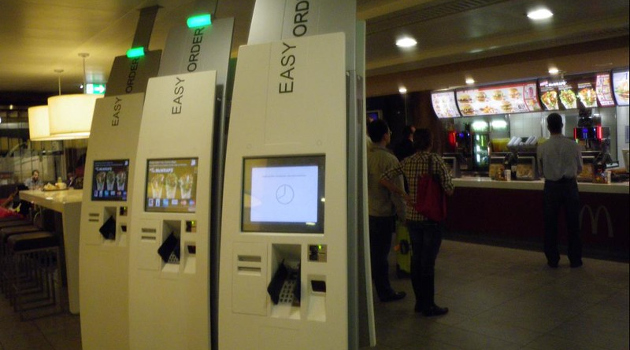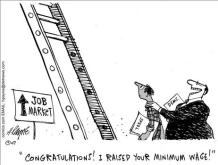As explained by public intellectuals such as Milton Friedman, Johan Norberg, John Stossel, and Orphe Divougny, the argument against minimum wage requirements is very simple.
If politicians dictate that people can’t be employed unless they receive, say, $15 per hour, then workers who are worth less than than amount (because of low skills, no experience, etc) won’t get hired.
And if a worker is worth $17 per hour and a government now says that worker must get $20 per hour, that’s a recipe for getting laid off.
Which is exactly what is happening in California. Here are some excerpts from a Wall Street Journal editorial.
California’s $20 an hour minimum wage for fast-food workers doesn’t take effect until April, but the casualties are already piling up. Pizza Hut franchises this week told more than 1,200 delivery drivers that they’ll lose their jobs before the higher wage kicks in. …it defies economics and common sense to think that businesses won’t adapt by laying off workers. Some may try to pass on their higher labor costs to customers. McDonald’s and Chipotle Mexican Grill have said that they plan to raise prices. But how many people will pay $8 for a Big Mac? Restaurants will probably deploy more automation to the extent they can, but fewer workers will mean longer waits in the drive-through. Pizza Huts are shaving their costs by out-sourcing delivery service to apps like DoorDash and GrubHub—ironic given how unions have fought against gig work. …Employment in California has fallen by 77,700 in the last year. Yet Democrats continue to impose higher costs and other burdens on business, oblivious to the lost jobs and services.
Why do politicians impose bad laws?
The simple answer is that they are kowtowing to unions.
So you may then ask why unions support bad laws?
I’ve previously noted that unions are willing to screw workers so long as the union benefits. And now we have more evidence for that view.
By the way, here’s some new research showing that minimum wages are bad for workers and the economy.
"Do minimum wages deliver what they promise? Effects of minimum wage on employment, output, and income inequality from occupational choice theory" https://t.co/IltyZHpG1o "the effects are mainly negative… and quantitatively large for high minimum-to-average wage ratios" pic.twitter.com/pIZhHvs4ll
— Scott Lincicome (@scottlincicome) August 22, 2023
Just as economists have long understood.
High minimum wages even lead to more homelessness!
Important and provocative finding from @seth_j_hill: "when cities raise their minimum wage by 10%, relative homeless counts increase by three to four percent." Full paper at https://t.co/P5zwiiSp88 pic.twitter.com/lKFoIuhOj2
— Josh Kalla (@j_kalla) June 13, 2023
Let’s close with a bit of good news.
Professor Bryan Caplan explains that inflation (thanks, Federal Reserve!) is making the minimum wage less and less relevant.
One upside of Bidenflation is that the federal minimum wage has almost been abolished. And the sky has not fallen. pic.twitter.com/flVYuFXIkv
— Bryan Caplan (@bryan_caplan) January 11, 2023
But note that Bryan is only talking about the federal minimum wage. States and cities still have the power to throw people out of jobs.
P.S. If you want to see me ranting and raving about the minimum wage, click here, here, and here.
———
Image credit: Byung Kyu Park | CC BY-SA 2.0.



